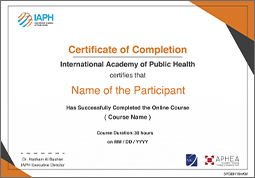Infection Control-Level 2
Description
Infection control practices can greatly reduce hospital associated infections. The goal of infection prevention is to protect the patients, care givers and visitors in a cost-effective manner.
This course is designed to provide participants with an overview of contemporary infection prevention and control practices for a variety of settings. This includes global application to both human and veterinary environments.
Learning Outcomes
- List important components of hospital/clinic based infection prevention and control (IPC) program
- Understand areas of risk to the host such as surgical site, IV and urinary catheters and ways to prevent infection
- Describe the influence of the environment on the risk of infection.
- Design and evaluate surveillance activities in specific settings (veterinary clinic, human hospital, and resource settings)
- Describe the advantages and disadvantages of the various methods for disinfection and sterilization
- Discuss the relationship between IPC practices and prevalence of MDR Organisms.
- Implement Global Patient Safety Program: ''CLEAN CLEAR IS SAFER CARE''.
- Surgical Site Infection
- VAP and CLABSIs
- The CAUTI and Infection Control in Dialysis Unit
- Decontamination
- Effective Hospital Infection Prevention and Control Program
- Surveillance System
- Hand Hygiene Compliance

Duration:
30 Learning Hours
Accredited By:


Certificate

Are you interested in the course?
Get notified once the course is open by clicking on
Infection Control-Level 2
Thank you for registering your interest! We appreciate your enthusiasm for this course. As soon as it becomes available, we will reach out to you with all the details. Stay tuned!